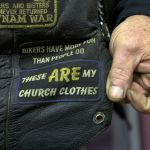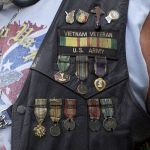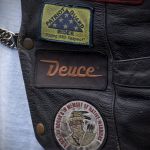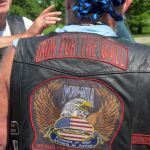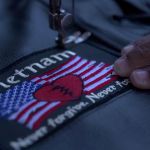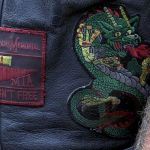Ron “Stray Dog” Hall is the force to be reckoned with in Debra Granik’s acclaimed documentary Stray Dog, which has its national television premiere Monday, November 9 on Independent Lens on PBS [10pm; check local listings]. “Sympathetic without being sentimental or condescending,” wrote Tim Grierson in Screen International, “Stray Dog is an enormously touching, understated look at an aging Vietnam veteran still wrestling with the invisible scars of a war that took place some 40 years ago.” And while the motorcycle-riding vet is still fighting his own demons from that experience, he also reaches out to help “brothers and sisters” — fellow veterans in need. Through his trials and tribulations Ron has kept track of all the things that are important to him by collecting patches that tell his life story.
Below is a gallery of Ron’s patches, followed by poignant thoughts from “Stray Dog” himself about what each represents.
- “These Are My Church Clothes” + “Bikers Have More Fun Than People Do”
- Nickel, Penny, Dime
- “Deuce”
- “Run for the Wall”
- The “Vietnam Never Forgive Never Forget” Patch (That Ron Designed)
- “The Dragon’s Tail”
Scroll down to the end to watch a short video with Ron and Alicia shopping for patches.
Run for the Wall
[About this organized motorcycle ride to promote healing for veterans] “It’s like a military movement. They fill up a thousand motorcycles in 35-40 minutes…These guys are organized. They send out road crews in the front and the road guards tell people where to turn so they don’t get lost. So there’s a lot that goes [in]to it when you get this many people together. You can imagine the hassle if you get this many bikers all riding together without any kind of police escort or any kind of fuel coordination, that wouldn’t have worked. So it’s not an easy task for the people that organize this. You finish the ride one year, they are already starting to organize the one next year.
“Now most guys would say, ‘we ride for those who can’t.’ It is symbolic in that our brothers can’t do it but we are riding. [But] in truth we are doing it for ourselves because we need the therapy. We are doing it to get our brotherhood back. We are doing it to feel like we belong to something.
“We are bikers, we are going to ride, and to say we ride for those who can’t is understandable and an honorable way of looking at it. But the deeper truth is we do it because we need it. It’s good for us to do it. It’s like a funeral, man. You know a funeral is not doing a dead guy any good, they ain’t there, but the family needs that. They need their closure. They need to be able to say bye; the funeral is for the living, not for the dead, and to some degree, the ‘Run for the Wall’ is similar: we need to do it for us.
“I wanted everyone in the country to make that ride. The ride itself, is very important. Of course the destination is important as well, but when you ride there you hang with your brothers, you hang with people that can understand you. You hang with people who you can talk to about things that you haven’t been able to talk to anyone else with the whole year. It’s a time where you don’t have to feel lonely. That’s one of my great hopes [for] this documentary is be [seen] in small towns. There are still people all across this country that don’t even know what happened, that have no idea. There’s veterans out there still alone but don’t realize there is a whole brotherhood that will welcome them. They don’t have to be alone.”
Nickel, Penny, Dime
Debra Granik: “Why did you replace your medals with a penny, nickel, and a dime?”
Ron: “I put the coins on because that’s about what the medals were worth when they originally gave them to me. You know, nobody in this country cared. The government didn’t care, they sold us out, but times have changed since then.“
Debra: “Have you seen other vets who have replaced their medals with coins to express that feeling?”
Ron: “I mean, you hear things like ‘yeah, you can take this Purple Heart home and with a dollar you can get a cup of coffee,’ things like that which essentially is the same attitude.”
Deuce
“I just happen to love this motorcycle more than I do than any model out there. They are limited edition; [Harley] only made them for a few years, then stopped, and all of a sudden it’s more valuable down the road because they are rare. So people will buy them. If you look at the Deuce, it’s kinda long and lean [compared to] the other Harleys — the fat boys, the knot train or the road king — they are a little wider and more stocky. The Deuce is built more on the frame, the way a motorcycle used to be, old school.”
Vietnam Never Forgive Never Forget (Designed by Ron Himself)
“I have considered having more patches made — changing the words to ‘Veterans’ instead of ‘Vietnam’ because there is still another war going on and I respect those guys too; and probably just simply say ‘can’t forget’ instead of ‘never forgive.’ Because people ask me, ‘what do you mean by forgiveness?’ I don’t even know what the hell forgiveness is. And I’m not into necessarily blaming any human for that because I wouldn’t know who to blame anyway. You can’t find one person and say they started this. Not one person did, and most of the people were doing what they thought was right; well, I ain’t going to say most of them. I’m saying a lot of them did…
“People ask us that: ‘Why don’t you just forget about it? It was 45 years ago.’…Hell no, man. I had a nightmare last night. I was in Vietnam. People don’t understand it, and again I don’t blame them not understanding.”
The Dragon’s Tail
“You ride the Tail, you get the patch. [The Dragon Tail is] eleven miles, 318 curves. A little mountain coming out of North Carolina into Tennessee. It’s part of what they call the Devil’s Triangle. Unfortunately, there are some four-wheelers that come across it and that’s one of the things that make it very dangerous because you can’t see around these curves. You get into that sucker and usually it’s kind of a foggy mist because you’re going over the top of the mountain. And it looks kinda like death, doom, and destruction. Sunlight don’t even penetrate it. It’s got foliage and trees and shade around it and then the fog sets in…It’s kind of humbling.
“One of the biggest dangers with the Dragon Tail is the young boys on the crotch rockets: a small motorcycle that has a high RPM and they like to race them. They’ll time themselves on how long it takes them to go over one side to the next. Motorcycles, we ain’t gonna be stupid about even trying that. We couldn’t do it anyway. Too much inertia and too much weight to pull us over. We just ride it, not proving nothing except that we can make it over alive and back. That’s our accomplishment if we can do that.
“They got a tree on the North Carolina side that’s called the ‘The Tree of Shame.’ It’s got a lot of motorcycle parts nailed to it, attached to it from machines that have been wrecked and tore up on it….Ain’t no use in trying to rush to your death, it’s gonna happen. You don’t have to fly across it, just ride it, take your time and do what you got to do to be safe.
[Watch this short UNC-TV feature about motorcycles on “The Dragon’s Tail” road]
These Are My Church Clothes + Bikers Have More Fun Than People Do
“The meaning of this patch comes from [the story of a] biker going to a conventional church wearing biker clothes. The preacher tells him he’s not properly dressed to attend their services, and that he should go out and talk to God about that. So the biker leaves, and the preacher sees the biker a few days later on the street and he’s wearing his biker clothes and the preacher says, ‘did you go talk to God about them clothes?’ and the biker says, ‘yes sir, I did.’ And the preacher says, ‘well, what did God tell you?’ And the biker answers, ‘God told me that he don’t know you.’ Which means, essentially, accept someone without judgment. These are my biker clothes and [they] work for me because I would go to the biker church, and most of the people there were like me.
“[Bikers] are more real, in a sense of poetry, we are more real than real. It’s like we are not wearing a mask. This is who we are, we are not pretending to be otherwise. We don’t go to church on Sunday and say ‘praise the Lord,’ and then go home and kick the neighbor’s dog and beat our wife. We’re not phony, and yeah we tend to have more fun. We can afford to have more fun because we’re real…We don’t need to pretend.”

